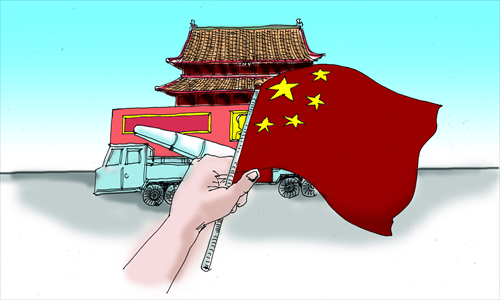
Illustration: Luo Xuan/GT
I was given the great honor of being invited to watch the military parade marking the 70th anniversary of the end of the WWII at Tiananmen Square on Thursday.
To be honest, I brought with me to Beijing a heavy heart but also high expectations for the ceremony.
My heart was undoubtedly heavy as it was filled with my knowledge of how the march of fascism and imperialism destroyed millions of lives across Europe, Asia and North Africa in the first half of the 20th century.
The disaster that was WWII should be engraved into the memory of all humankind, and serve as a bitter lesson forever.
China was fighting the war earlier than most of its allies. The Chinese made great contributions and sacrifices to arrive at the eventual victory. The spirits of unity and solidarity have since been passed down through generations.
On the other hand, my high expectations were, among others, that the Chinese military and other countries' guards of honor would show these precious spirits at the event.
The Chinese military should be known to the world as a confident self-defense power, because peace is not given, but earned and defended by reliable military prowess - a fact which clearly shows itself through the regional wars and battles after WWII.
Therefore, the military parade has unleashed an anti-war signal, which can reinforce people's faith in peace and stability.
Chinese President Xi Jinping's speech at the ceremony has garnered worldwide attention. In my humble opinion, there are three highlights that need to be put into spotlight.
First, Xi emphasized that China remembers forever what other countries did to help China win the war, even though the world has generally remained peaceful for decades. The anti-fascist war 70 years ago was a just cause for all humankind against evil. Just as China enshrines the help of its former allies in its mind, the world should have a better understanding of China's peaceful rise.
Second, Xi called on the international community to draw lessons from history, safeguard the hard-won peace, and join hands to establish a community of shared destiny in all humankind. He also appealed for mutual respect, peaceful coexistence, common prosperity and recognition of the global order. He stated that China would stick to a peaceful rise with no intention to become a hegemonic power or expansionist, and would never impose the misery it went through on other countries.
Most Southeast Asian countries have similar painful memories about the war. Such a promise by China, the second largest economy and a lively member in the world stage, can serve as reassurance for these countries.
Third, China's peaceful intention is not just words; the country walks its talk. At his speech, Xi announced that China would cut down its military personnel by 300,000. As a global power, China needs strong military capabilities to defend its own interests and the world's morality and justice.
Although many countries, especially those which have been the victims of war, can understand China's intention in developing military forces, China still believes that a large disarmament can send a signal to the outside that arms race is not on the regional agenda. Beijing hopes that regional tensions can be soothed after China's disarmament, and countries in the region can put more strategic resources in economic cooperation.
The military parade was concluded by releasing thousands of doves, a gesture to show the peaceful aims of the ceremony. We hope there could be greater agreement among different countries with the legitimacy of China's self-defense improvement, the necessity of disarmaments, and the ultimate goal of world peace.
The author is a senior fellow with the S. Rajaratnam School of International Studies, Nanyang Technological University, Singapore. opinion@globaltimes.com.cn
Read more in Special Coverage:



